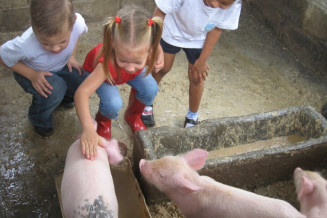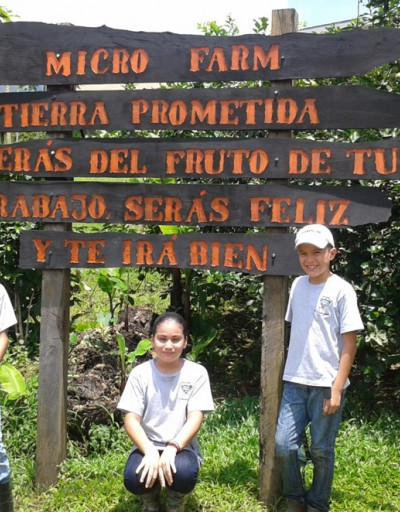On a Monday afternoon, it is quite surprising to see that the classrooms of San Francisco School in Peñas Blancas de San Ramón are empty. To find the young students, follow the bleating of goats, until you reach a plot of land. There, students are busy feeding animals, while their teacher is explaining how to raise goats to produce milk. For these students, it’s just another day at school!

Education for Sustainable Development (ESD) is at the heart of this community-led project. ESD seeks to provide learners of all ages with the knowledge, skills, values, attitudes and power to address interconnected global challenges such as climate change, biodiversity loss, unsustainable resource use and inequalities.
The UNESCO Office in San José has supported the Ministry of Education ESD agenda by co-designing and advocating for ESD Policy on Education; building teacher capacity and knowledge in ESD; implementing the ESD blended learning course on ESD; and finally, co-engineering the National Strategy to put into action the ESD Policy on Education. From 2015 to 2019, teachers were able to participate in capacity-building workshops where materials were produced for education projects and the ESD course.
In line with UNESCO and the Ministry of Education’s partnership, the Finca Tierra Prometida project is deeply collaborative, involving members of the local community, NGOs, universities, and the Ministry of Education in the development process of the programs and curriculum.

Inspired by ancestral heritage and a desire to deter the local community from devastating the environment, Finca Tierra Prometida seeks to educate learners on sustainable practices and skills that they will carry with them for the rest of their lives. The project began with a donation of a 5,000 m2 plot of land by the Grand Circle Foundation. Garden spaces were cleared and a stable was created to raise animals.
By transforming the land surrounding the school into an organic farm, students learn how to take care of animals, reuse waste, and grow organic products. Along with these skills, teachers are also transmitting critical values and attitudes: love and respect for nature.
Curriculum and study programs include agricultural and mathematical knowledge and skills centered on sustainability. The purpose of the project is to ensure that students ‘learn by doing’. This way of teaching helps children not only acquire basic academic knowledge and skills, but also to learn how to problem-solve in their daily life. Adopting sustainable lifestyles is essential to preserving what nature and earth have to offer. According to Tatiana Arroyo, whose children went to San Francisco School, the school’s pedagogy should be replicated in other education institutions in the country.
The Finca Tierra Prometida project invites all of us to reflect on the importance of being able to value what our earth offers. Students learn that everything they produce on the farm can be done without harming the environment. As we all continue adapting to current and future realities, schools can look to role models like Finca Tierra Prometida in order to revolutionize school curricula through the holistic integration ESD approaches.


